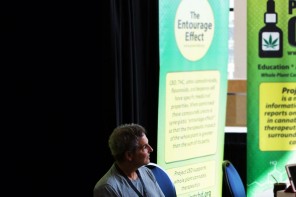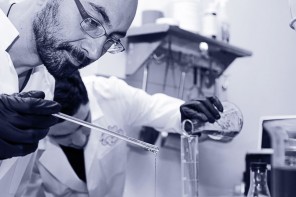Dean Petkanas: Kannalife Sciences, Inc.
He’s a man with more background than you could possibly fathom. His expertise spans across numerous fields and he perceives his achievements by the individual strides he takes every day. Kannalife Sciences is doing great things in the cannabis space and is advancing medicine in powerful ways, but it’s this one particular gentleman who’s behind making it all happen. That is who we are taking the time to get to know a little better. He’s the energy, the force, and the unwavering drive that is building the respect for the cannabis plant in the scientific community! Meet Dean Petkanas.
What was the deciding factor for you to join this particular industry?
My business partner, Thomas Kikis, approached me in late 2009 asking for my assistance in helping him get into the industry. I was very reluctant on various fronts, but he persisted over the next several months to approach me despite the fact that I had told him that I just did not want to be involved in the industry. On his third attempt to capture my attention, I said that if I was to get involved and work on a business plan with him, then I wanted to focus on the medicinal side of cannabis and be in non-violation of the Controlled Substance Act. My involvement was also contingent on Thomas reviewing a paper I wrote about the Gonzales vs. Oregon case. In that case, I looked at the Supreme Court’s decision-making process across several panels and cases, one being a case in Oregon on the Death and Dignity Act, another case in Washington on the Death and Dignity Act, and the Diane Monson case in California which was for penalties of care and patients’ personal care for themselves in growing medicinal marijuana.
I asked him to review those papers, so he could get a better understanding on where my mindset stood. It took him quite a bit of time to convince me and then sometime in February 2010, I began the process of researching areas of the industry that I thought were suitable for the development of pharmaceutical-grade medicines made from cannabinoids or synthetic cannabinoids, which simply mimic the effects of the actual plant. I came back to Thomas sometime in mid to late April and told him that I thought I had the basis for a business plan for pharmaceutical medicine in the industry. That’s when we really started drilling down on each segment of the company’s business – The first being pharmaceutical sciences, the second being establishing quality practices and controlled reassurance of medical marijuana in raw form, extracted form, semi-purified forms, etc. and third was to develop a topical skincare line and we’ve engaged in getting those three sectors up and running!
How is Martin Scorsese’s The Wolf of Wall Street affecting the reputation of your company?
It’s not. I feel like it’s often sited to grab eyeballs so the journalist publishing the article gets more traction in the media space.
What skills from your previous experiences helped you in what you are doing now?
In every area I’ve practiced in; whether that be investment banking, operational work at a pharmaceutical company, and being in the lab with organic chemists and learning from them about plant-based medicine in the development of drugs like Taxol (Paclitaxel), an anti-cancer drug, and Niprisan, a drug used to treat Sickle Cell disease, gave me the body of knowledge I needed to view cannabis in a different light, a very different light than anyone currently in the industry was looking at it. So, where we turned our focus towards for Kannalife Sciences was based on the experiences and knowledge I had in those previous careers. It gave me the foundation I needed to move forward with this industry.
It gave me the foundation I needed to move forward with this industry.
Tell me about the point in the time you realized the coming of the ‘green rush’?
I would say sometime in the late 80s. I had a background in constitutional law, I self-studied finance as a banker, I’d dabbled in economics, and I had a love for medicine. These multiple disciplines swirled around from time to time and they, in a way, aligned at a few points in time. What I looked at when I came to conclude that it was only a matter of time that the ‘green rush’ would occur, was the parallels marijuana prohibition had with what had happened with alcohol. Now, that was a congressional amendment; The 18th Amendment prohibited alcohol and the 21st Amendment repealed it. That was a period that spanned 12 years in this country and it gave way to mob control, violence, and all sorts of illicit businesses. The bottom line is that although this prohibition was enforced by a body of legislature written by Congress, I didn’t believe it to have that same ‘tone’ per say, or permanence that constitutional law had. In other words, I knew the prohibition on cannabis was only temporary, I just didn’t know at the time that it would take another 20-some odd years for it to finally break ground. We’re going on 44 years now!
From a constitutional perspective, you could see it many different ways. When you’re hearing all these people speak out on the prohibition on cannabis, what you’re seeing is sovereign empowerment. You’re hearing people say ‘I want this!’ The government shouldn’t be in the business of telling us our business and that’s essentially where these state laws come from; the people, the citizens.
I knew the prohibition on cannabis was only temporary, I just didn’t know at the time that it would take another 20-some odd years for it to finally break ground.
What are you doing to impact the industry?
We set our goals to help people and more specifically, helping people who are suffering from the two illnesses that we chose underneath our license, Hepatic Encephalopathy (HE) and Chronic Traumatic Encephalopathy (CTE), which is the disease that’s being linked to concussions and leading to suicides in athletes (See story: Former NFL Player’s Game Plan to Tackle Chronic Traumatic Encephalopathy). If we can bring forth therapeutic medicines to the marketplace to suit the needs of those who are suffering from one or both of those diseases, we are satisfying our goal to help people and are making an impact.
Our success in developing these medicines also plays a role in educating those who still believe that cannabis is not medicinal. America is supposed to be ahead of the curve; We are supposed to be the epitome of innovation, but countries like Israel and Brazil are the ones who are really taking that lead from us in terms of development in these areas and we’ve fallen woefully behind in respecting cannabinoid-based therapeutics. We need to educate our marketplace and why that is important is because that is what will open doors for our industry; We will be able to weigh into Congress, we will be able to attract more professionals to the field of research and development of cannabis, and one day, we will be able to create cures! There is this stigma on cannabis that it’s the devil’s plant, that it’s poison, but by bringing forth evidence from a scientific perspective, we can bridge the gap of what people think about cannabis and what it really is.
Describe your work ethic to me in one word.
Relentless.
What does a typical work day look like for you in your business?
We’re a small, tight, lean organization. Tom and I are each handling multiple disciplines right now; We are in the middle of five or six different projects at any given time; I don’t clock in and punch out, it doesn’t work that way. I could be up as early as 5am EST talking to a business partner in Japan, I could up as late as 2am in the morning talking to a business partner in Europe. There is no clock variable that applies to work performance in the company and everyone in Kannalife Sciences has this same work ethic.
How do you find inspiration in this industry? What have you found that has inspired you?
Others who are like-minded in the space like our first round financiers, Medical Marijuana, Inc. (OTC:MJNA) and guys like Mike Llamas who works harder than anybody I’ve ever met in my life and who has inspired me to continue to pick up the fight to bring medicine into the market. Their support and the support of everyone else at Hemp Meds who are all as equally dedicated to bringing forth cannabis medicine to a community that so desperately needs it, is inspiring! Building the bridge of knowledge for our industry is going to open up a lot of doors and that’s inspiring. And of course, those who are in the inner circle of Kannalife Sciences; our scientific team, our board of advisors, the families that are out there doing their job lobbying to legislature are all the kind of people who share our vision and inspire me.
Tell me about an esteemed achievement of yours.
An esteemed achievement to me is every day I walk a straight line. Every day, I give glory to God for giving me the opportunity to be in the position that I am in and everything in between. I’ve been the co-inventor to patents, I’ve been involved in taking an anti-cancer drug company public, and the one that I like to note is when I took some college kid deep with a 95mph fast ball! I think it’s a day to day thing: Every day that you wake up to move one step further to fulfilling God’s purpose in your life to approve the lives of others is an esteemed achievement to me.
I’ll tell you one more thing that’s very important to understanding this day to day perspective on achievement. Years ago, when I was in a transitional period in my life, I was on a ‘homeric odyssey’ for 12 years and had lost everything; I was face down, had lost my home and my marriage, and I thank God that she is still my best friend. At that time, I offered to teach at my church; they had some transitional students that they didn’t want to send to public school, so I setup a syllabus and curriculum for constitutional law and economics, a very foreign subject, but something I believed would be give high school students some sort of college mentality. That was years ago, but I learned that 2 of those students that I taught had continued on to pursue law school. When you have that kind of an impact, you feel validated in knowing that those small daily movements and achievements really make a difference. At that present moment, you don’t know what’s going to come from it, but it’s what happens later that is the major impact!
Every day that you wake up to move one step further to fulfilling God’s purpose in your life to approve the lives of others is an esteemed achievement to me.
How would you advise someone who wants to join the industry?
First, I think that you should find the area that you want to focus on and know that there so many to choose from! This industry gives life to many different elements: Retail, wholesale, agriculture, technology, research, quantitative, pharmaceutical, media… I would say to that curious entrepreneur that they need to find what their talent is that will allow them to do what they love to do every day and apply it to this industry and make sure that it’s commercially viable.
If we are sitting across from each other a year from now, how will our conversation about the ‘green rush’ be going?
Now, that’s an interesting question because you’re asking me to look into a crystal ball. If we’re sitting across from each other, that probably means that is it’s a restaurant table and we might be drinking either vodka or tequila, maybe toasting to our mutual successes and looking ahead to how this country is going to embrace a new social dynamic as it did when it repealed prohibition in 1933. What I’m saying is, that it’s safe to say that within the year, marijuana will be removed as a Schedule I controlled-substance and be subject to the same regulation and control on distribution that alcohol has in the marketplace. I originally chose March 24, 2016 two years ago and I’ll stick to that date. It’s either going to be the Supreme Court or it’s going to be Congress. To further note and back up to when we were talking about the paper I wrote on Gonzales vs. Oregon, it’s clear that there’s going to be a juggling act between the branches of government. It’s just a matter of who gets there first, who makes the first move.










